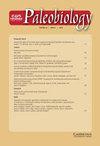The structure of the nonmarine fossil record: predictions from a coupled stratigraphic–paleoecological model of a coastal basin
IF 2.7
2区 地球科学
Q2 BIODIVERSITY CONSERVATION
引用次数: 2
Abstract
Abstract. Presented here is a coupled model of the nonmarine fossil record, based on a geometric model of deposition, a random-branching model of evolution, and an ecological model based on an elevation gradient. This model provides testable predictions about the stratigraphy and fossil occurrences in coastal nonmarine settings under three scenarios of sea-level change. A slow relative rise in sea level causes a declining ratio of channel to floodplain deposits, plus changes in community composition that reflect an upward increase in elevation relative to sea level. A rapid relative rise in sea level drives increasing aggradation rates, decreases the ratio of channel to floodplain deposits, and triggers a shift from higher-elevation (more inland) to lower-elevation (more coastal) communities. A fall in sea level produces an unconformity, manifested by valleys separated by interfluves. The resumption of deposition following the sea-level fall causes an abrupt shift in community composition across the unconformity, reflecting the duration of the hiatus and the increased elevation relative to sea level. This produces a cluster of first and last occurrences at the unconformity, and it is the only sequence-stratigraphic source of such clusters in a nonmarine system, in contrast to the multiple mechanisms for generating these clusters in marine systems. A central prediction of these models is that the nonmarine fossil record preserves systematic changes in community composition that reflect elevation (or equivalently, distance from shore). Diagnosing these gradients in ancient systems is a promising avenue of future research.非海洋化石记录的结构:海岸盆地地层-古生态耦合模型的预测
摘要这里提出了一个非海洋化石记录的耦合模型,基于沉积的几何模型、进化的随机分支模型和基于海拔梯度的生态模型。该模型提供了在三种海平面变化情况下沿海非海洋环境中的地层学和化石分布的可测试预测。海平面的缓慢相对上升导致河道与泛滥平原沉积物的比例下降,加上群落组成的变化,反映了海拔相对于海平面的上升。海平面的快速相对上升推动了沉积速率的增加,降低了河道与泛滥平原沉积物的比例,并引发了从高海拔(更内陆)到低海拔(更沿海)群落的转变。海平面的下降产生了不整合,表现为由分水岭分隔的山谷。海平面下降后沉积的恢复导致不整合面上群落组成的突然变化,反映了间断的持续时间和相对于海平面的海拔上升。这在不整合面上产生了一个第一次和最后一次出现的集群,它是非海洋系统中此类集群的唯一序列地层来源,与海洋系统中产生这些集群的多种机制形成鲜明对比。这些模型的一个核心预测是,非海洋化石记录保存了群落组成的系统变化,这些变化反映了海拔(或相当于与海岸的距离)。诊断古代系统中的这些梯度是未来研究的一条很有前途的途径。
本文章由计算机程序翻译,如有差异,请以英文原文为准。
求助全文
约1分钟内获得全文
求助全文
来源期刊

Paleobiology
地学-古生物学
CiteScore
5.30
自引率
3.70%
发文量
38
审稿时长
>12 weeks
期刊介绍:
Paleobiology publishes original contributions of any length (but normally 10-50 manuscript pages) dealing with any aspect of biological paleontology. Emphasis is placed on biological or paleobiological processes and patterns, including macroevolution, extinction, diversification, speciation, functional morphology, bio-geography, phylogeny, paleoecology, molecular paleontology, taphonomy, natural selection and patterns of variation, abundance, and distribution in space and time, among others. Taxonomic papers are welcome if they have significant and broad applications. Papers concerning research on recent organisms and systems are appropriate if they are of particular interest to paleontologists. Papers should typically interest readers from more than one specialty. Proposals for symposium volumes should be discussed in advance with the editors.
 求助内容:
求助内容: 应助结果提醒方式:
应助结果提醒方式:


